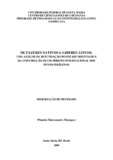| dc.creator | Marques, Pâmela Marconatto | |
| dc.date.accessioned | 2009-11-11 | |
| dc.date.available | 2009-11-11 | |
| dc.date.issued | 2009-09-16 | |
| dc.identifier.citation | MARQUES, Pâmela Marconatto. FROM NATIVE ACTS UNTILL ACTIVE KNOWLEDGES:
AN ANALYSIS OF THE REFOUNDATION OF THE BOLIVIAN STATE AND THE CONSTRUCTION OF AN INTERNATIONAL LAW OF INDIGENOUS PEOPLES. 2009. 104 f. Dissertação (Mestrado em Direito) - Universidade Federal de Santa Maria, Santa Maria, 2009. | por |
| dc.identifier.uri | http://repositorio.ufsm.br/handle/1/9712 | |
| dc.description.abstract | This paper proposes to examine the importance of the role of indigenous communities in the process of renewal of Bolivian constitution, as well as on the advances of
international law dedicated to indigenous issues. Once the social articulation and politicization of bolivian ethnic communities seem to provide a paradigmatic example
of the understanding of Indian activism beyond national borders, the attention devoted to it will be central, whose focus will be broadened in the final part of this dissertation. Whereas there is no conjucture analysis that can dispense the historic bailout, the treatment to the approval of the New Bolivian Constitution is supported by a welldefined historical setting. The approach try to bring together different areas of knowledge, preserving the multidisciplinarity that makes the study of international relations. Thus, the first chapter, devoted to retelling the Bolivian history from the perspective of indigenous communities, also enjoy of the theoretical framework of anthropology. The second chapter, in turn, involves the analysis of the reforms that is coming through the Bolivian National State today, highlighting the active participation of civil society - especially indigenous - in the construction of a new constitutional
agenda for the country. This approach will be followed by some polls about what it proposes to call an "International Law of Indigenous Peoples," witch, as well as the rebuilding of bolivian State, is also anchored on Indian activism. The analyses of the theme of this chapter shall be gathered law and political science. Finally, the conclusion, follows on some notes by Edgar Morin, and from them, the search for an understanding about the context that the experience witch is example the
"neoconstitutionalism" in Bolivia, where the experimentalism and hope seem to be the key to confronting the uncertainties of the future. | eng |
| dc.description.sponsorship | Coordenação de Aperfeiçoamento de Pessoal de Nível Superior | |
| dc.format | application/pdf | por |
| dc.language | por | por |
| dc.publisher | Universidade Federal de Santa Maria | por |
| dc.rights | Acesso Aberto | por |
| dc.subject | Ativismo indígena | por |
| dc.subject | Constitucionalismo | por |
| dc.subject | Direito internacional dos povos indígenas | por |
| dc.subject | Indian activism | eng |
| dc.subject | Constitutionalism | eng |
| dc.subject | International law of indigenous peoples | eng |
| dc.title | De fazeres nativos a saberes ativos: uma análise da refundação do estado boliviano e da construção de um direito internacional dos povos indígenas | por |
| dc.title.alternative | From native acts untill active knowledges:an analysis of the refoundation of the bolivian state and the construction of an international law of indigenous peoples | eng |
| dc.type | Dissertação | por |
| dc.description.resumo | O presente trabalho propõe-se a analisar a importância da atuação das comunidades indígenas no processo de renovação constitucional boliviana e nos avanços da
legislação internacional dedicada à questão indígena. Uma vez que a articulação social e politização étnica das comunidades bolivianas parecem fornecer um exemplo paradigmático à compreensão do ativismo indígena para além das fronteiras nacionais, a ela dedicar-se-á atenção central, cujo foco será ampliado na parte final desta dissertação. Considerando que não há análise de conjuntura que possa prescindir do socorro
histórico, o tratamento dispensado à aprovação da Nova Constituição Boliviana estará amparado por uma moldura histórica bem delimitada. A abordagem desenvolvida busca
congregar diferentes áreas do conhecimento, preservando a multidisciplinaridade de que perfaz-se o estudo das relações internacionais. Assim, o primeiro capítulo, dedicado a
recontar a história boliviana sob a ótica das comunidades indígenas, gozará, também, do referencial teórico da Antropologia. O segundo capítulo, por sua vez, comporta a análise das reformas por que vem passando o Estado Nacional Boliviano na atualidade, destacando a participação ativa da sociedade civil notadamente indígena na construção de uma nova agenda constitucional para o país. Essa abordagem será seguida de algumas sondagens sobre o que se propõe chamar um Direito Internacional dos Povos Indígenas , e que, assim como a reconstrução estatal boliviana, também está
ancorado sobre o ativismo indígena. Para lançar luz sobre a temática deste capítulo, serão congregados Direito e Ciência Política. Por fim, a título de conclusão, retomam-se alguns apontamentos de Edgar Morin e, a partir deles, busca-se compreender o contexto de que é expoente a experiência neoconstitucional boliviana, em que o
experimentalismo e a esperança parecem constituir a chave para o enfrentamento das incertezas do futuro. | por |
| dc.contributor.advisor1 | Seitenfus, Ricardo Antônio Silva | |
| dc.contributor.advisor1Lattes | http://lattes.cnpq.br/4115288272270492 | por |
| dc.contributor.referee1 | Padoin, Maria Medianeira | |
| dc.contributor.referee1Lattes | http://lattes.cnpq.br/7863155517478900 | por |
| dc.contributor.referee2 | Silva Filho, José Carlos Moreira da | |
| dc.contributor.referee2Lattes | http://lattes.cnpq.br/0410429186457225 | por |
| dc.creator.Lattes | http://lattes.cnpq.br/1897652370021397 | por |
| dc.publisher.country | BR | por |
| dc.publisher.department | Direito | por |
| dc.publisher.initials | UFSM | por |
| dc.publisher.program | Programa de Pós-Graduação em Integração Latino-Americana | por |
| dc.subject.cnpq | CNPQ::CIENCIAS SOCIAIS APLICADAS::DIREITO | por |


